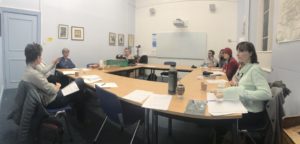Wednesday, 16 October, 4pm – 5:30pm (UCO: Room 36)
Our first meeting this semester focuses on the work of Ann Rigney on the Transnational Turn in Memory Studies.
Prof. Ann Rigney, who will deliver a CIMS public lecture on 31 October. Her new ERC-funded research project, (REACT), seeks to connect practices of memory to hope in the possibility of bringing about change.
Readings:
• ‘Transforming Memory and the European Project’, New Literary History, Vol. 43, No. 4, A New Europe? (AUTUMN 2012), pp. 607-628, John Hopkins University.
• ‘Remembering Hope: Transnational activism beyond the traumatic’ in Memory Studies, 11:3 (2018), pp. 268-380.
• ‘Remembrance as remaking: memories of the nation revisited’, in Nations and Nationalism, 24 (2), 2018, ppm 240-257.
Ann Rigney – Remembering Hope Transnational activism beyond the traumatic
Transforming Memory and the European Project – Ann Rigney
Rigney-2018-Nations_and_Nationalism

Summary of the event (written by Jorge Sarasola):
For this meeting, we read three of Ann Rigney’s articles: ‘Transforming Memory and the European Project’ (2012), ‘Remembering Hope: Transnational activism beyond the traumatic’ (2018), and ‘Remembrance as remaking: memories of the nation revisited’ (2018). The goal of these reading groups is to discuss the body of work of eminent thinkers in the field and look at some of their most recent publications in order to stay up to date with new directions in the field of studies. We spent most of it discussing the uses and misuses of memory by the European Union, with Rigney offering a critique of the kind of memory favoured by the EU’s history museum, “The European House of History” in Brussels. After that we examined ‘Remembering Hope […]’, a text with several points in common with the Public Lecture that Prof Rigney later gave in St Andrews that semester. In it, she points in two interesting directions to understand recent shifts in the field of study: (i) conceiving of memory in a transnational fashion (as opposed to using national frameworks); and (ii) attempting to counter-act the tendency to focus on traumatic memories of the past by researching hopeful memories. Little time was left to discuss the final paper, where Rigney argues that ‘myths’ and ‘memories’ are often unfairly conflated in Anthony Smith’s landmark collection Myths and Memories of the Nation (1999). Instead, she points to a different, more malleable conception of memory which could be used to interrogate the nations’ myths.
